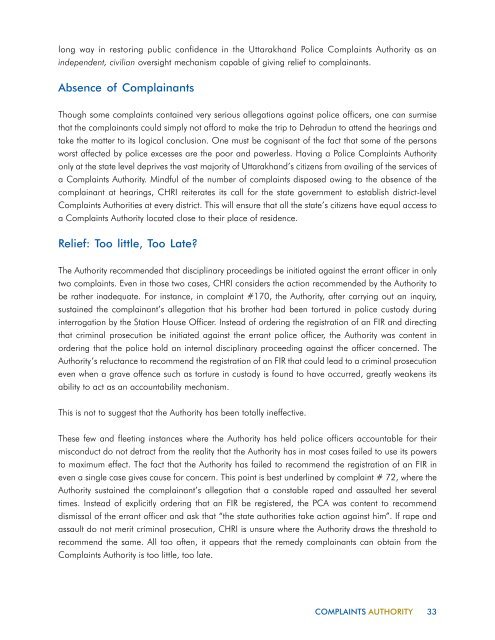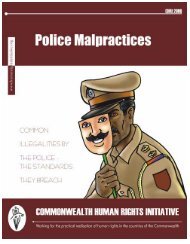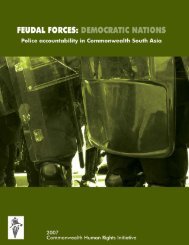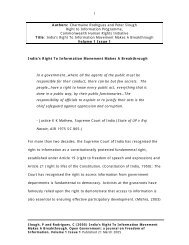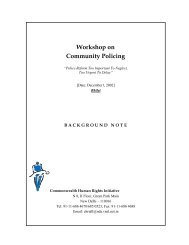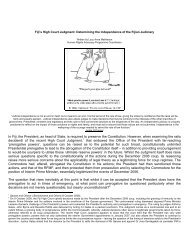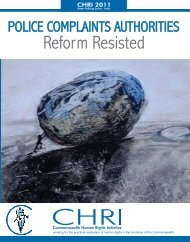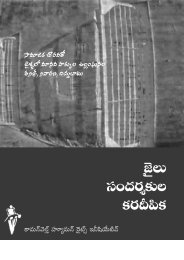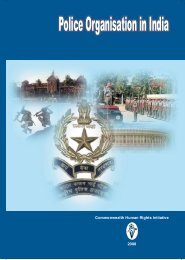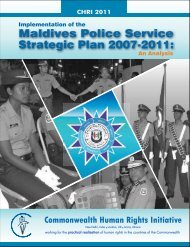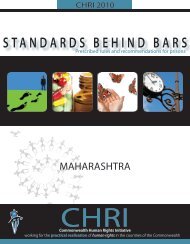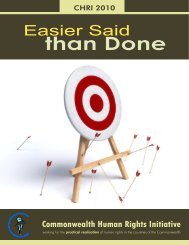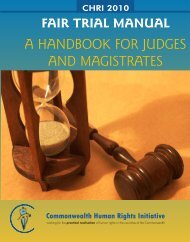Uttarakhand State Police Complaints Authority - Commonwealth ...
Uttarakhand State Police Complaints Authority - Commonwealth ...
Uttarakhand State Police Complaints Authority - Commonwealth ...
Create successful ePaper yourself
Turn your PDF publications into a flip-book with our unique Google optimized e-Paper software.
long way in restoring public confidence in the <strong>Uttarakhand</strong> <strong>Police</strong> <strong>Complaints</strong> <strong>Authority</strong> as anindependent, civilian oversight mechanism capable of giving relief to complainants.Absence of ComplainantsThough some complaints contained very serious allegations against police officers, one can surmisethat the complainants could simply not afford to make the trip to Dehradun to attend the hearings andtake the matter to its logical conclusion. One must be cognisant of the fact that some of the personsworst affected by police excesses are the poor and powerless. Having a <strong>Police</strong> <strong>Complaints</strong> <strong>Authority</strong>only at the state level deprives the vast majority of <strong>Uttarakhand</strong>’s citizens from availing of the services ofa <strong>Complaints</strong> <strong>Authority</strong>. Mindful of the number of complaints disposed owing to the absence of thecomplainant at hearings, CHRI reiterates its call for the state government to establish district-level<strong>Complaints</strong> Authorities at every district. This will ensure that all the state’s citizens have equal access toa <strong>Complaints</strong> <strong>Authority</strong> located close to their place of residence.Relief: Too little, Too Late?The <strong>Authority</strong> recommended that disciplinary proceedings be initiated against the errant officer in onlytwo complaints. Even in those two cases, CHRI considers the action recommended by the <strong>Authority</strong> tobe rather inadequate. For instance, in complaint #170, the <strong>Authority</strong>, after carrying out an inquiry,sustained the complainant’s allegation that his brother had been tortured in police custody duringinterrogation by the Station House Officer. Instead of ordering the registration of an FIR and directingthat criminal prosecution be initiated against the errant police officer, the <strong>Authority</strong> was content inordering that the police hold an internal disciplinary proceeding against the officer concerned. The<strong>Authority</strong>’s reluctance to recommend the registration of an FIR that could lead to a criminal prosecutioneven when a grave offence such as torture in custody is found to have occurred, greatly weakens itsability to act as an accountability mechanism.This is not to suggest that the <strong>Authority</strong> has been totally ineffective.These few and fleeting instances where the <strong>Authority</strong> has held police officers accountable for theirmisconduct do not detract from the reality that the <strong>Authority</strong> has in most cases failed to use its powersto maximum effect. The fact that the <strong>Authority</strong> has failed to recommend the registration of an FIR ineven a single case gives cause for concern. This point is best underlined by complaint # 72, where the<strong>Authority</strong> sustained the complainant’s allegation that a constable raped and assaulted her severaltimes. Instead of explicitly ordering that an FIR be registered, the PCA was content to recommenddismissal of the errant officer and ask that “the state authorities take action against him”. If rape andassault do not merit criminal prosecution, CHRI is unsure where the <strong>Authority</strong> draws the threshold torecommend the same. All too often, it appears that the remedy complainants can obtain from the<strong>Complaints</strong> <strong>Authority</strong> is too little, too late.COMPLAINTS AUTHORITY 33


